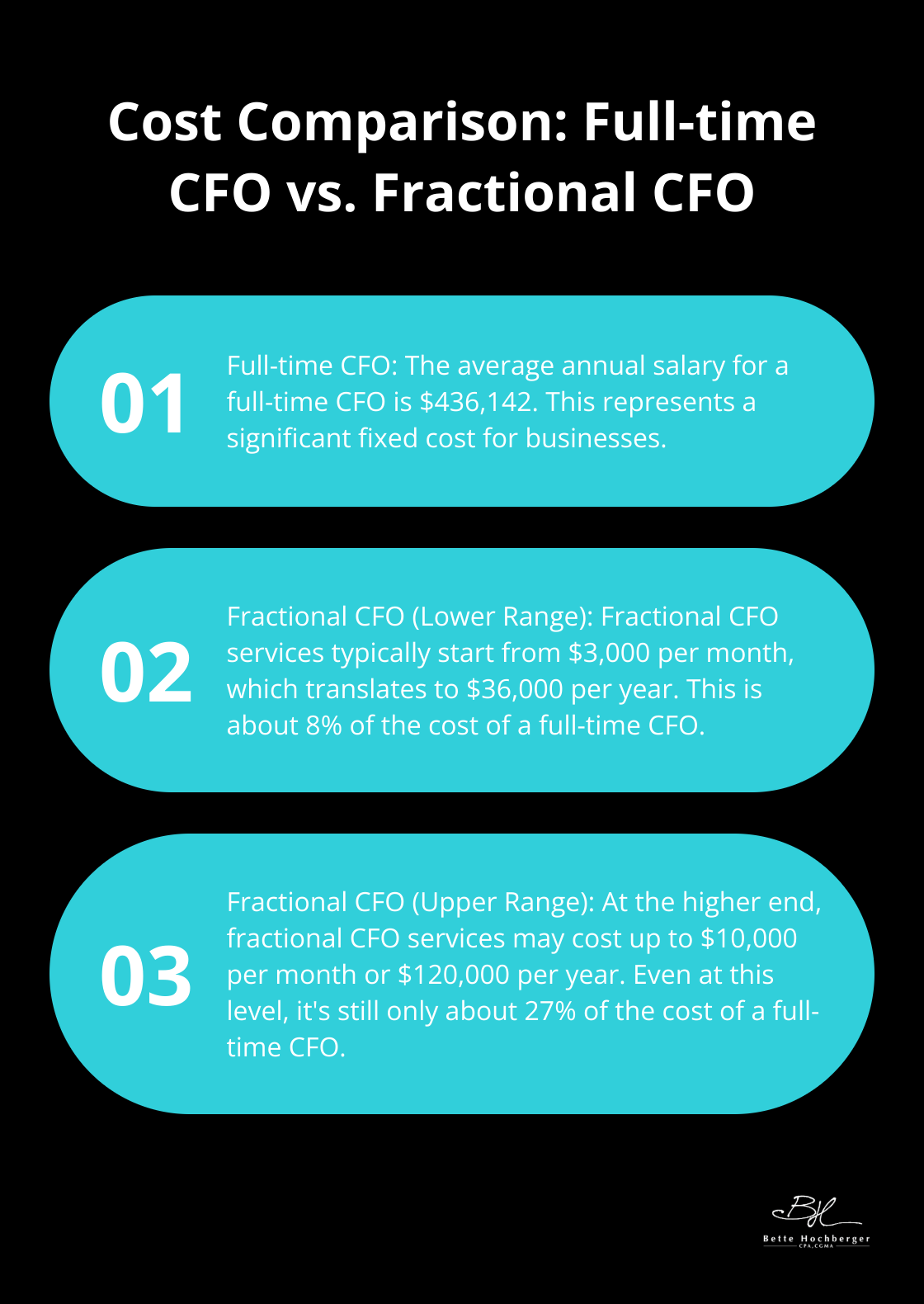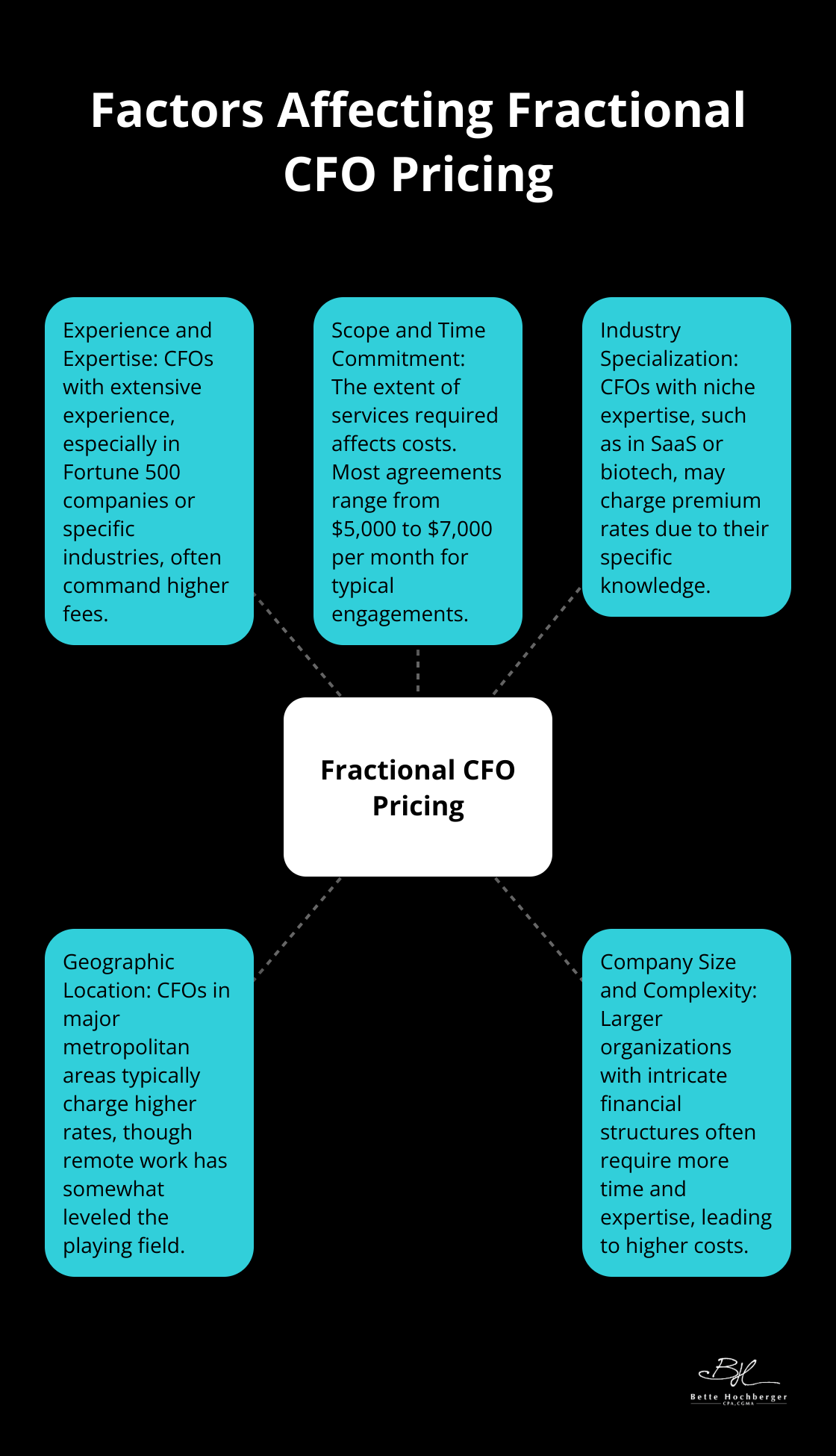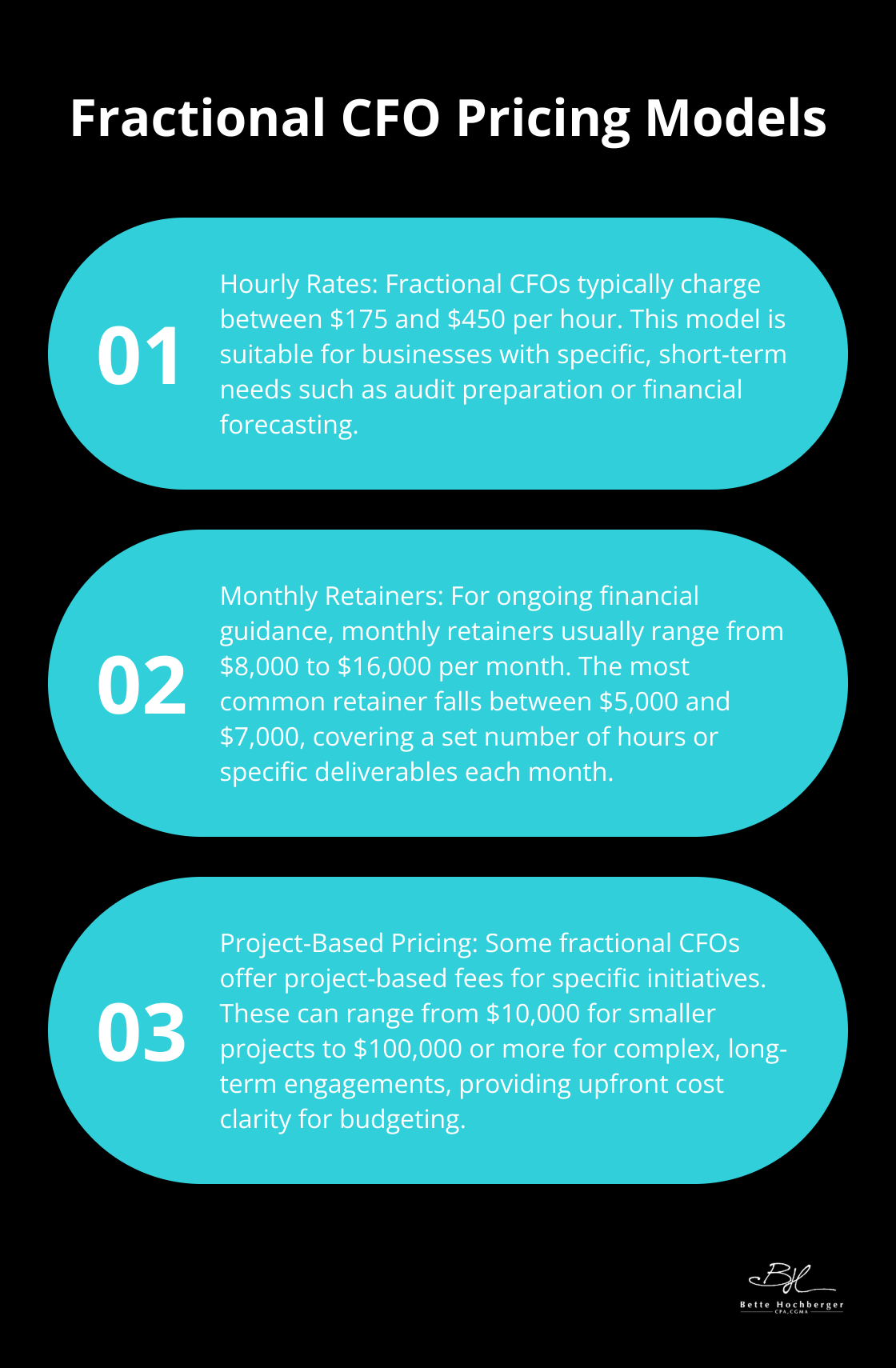At Bette Hochberger, CPA, CGMA, we often field questions about the cost of fractional CFO services. Many business owners are curious about this financial solution but hesitate due to uncertainty about the price tag.
In this post, we’ll break down the factors that influence fractional CFO costs and explore common pricing models. By the end, you’ll have a clear understanding of what to expect when considering this valuable financial resource for your company.
What Is a Fractional CFO?
Definition and Role
A fractional CFO is a financial expert who provides high-level financial strategy and management on a part-time or contract basis. This professional fills a critical gap for small and medium-sized businesses that need advanced financial guidance but can’t justify the expense of a full-time CFO.
Core Responsibilities
Fractional CFOs take on multiple responsibilities within an organization. They:
- Oversee financial planning
- Manage risk
- Optimize cash flow
- Translate complex financial data into actionable insights
- Assist with fundraising efforts
- Help secure loans or attract investors
Financial Strategy and Forecasting
One of the most valuable services a fractional CFO offers is the development of robust financial strategies. These professionals create detailed financial models and forecasts, which help businesses plan for various scenarios. This forward-thinking approach enables informed decisions about expansion, hiring, or capital investments.
Cost-Effective Financial Expertise
For small and medium-sized businesses, a full-time CFO often represents an unattainable expense. Recent data shows that the average salary for a full-time CFO is $436,142 per year. In contrast, fractional CFO services typically cost between $3,000 and $10,000 per month (depending on the scope of work). This significant cost difference makes high-level financial expertise accessible to growing companies.

Diverse Experience and Innovative Solutions
Fractional CFOs bring a wealth of experience from working with multiple clients across various industries. This diverse background allows them to apply best practices and innovative solutions to specific business challenges. They quickly identify areas for improvement in financial processes and implement efficient systems to streamline operations.
The flexible nature of fractional CFO services means businesses can scale the level of support as their needs change, making it an adaptable solution for evolving companies. As we move forward, it’s important to understand the factors that influence the cost of these valuable services.
What Affects Fractional CFO Pricing?
Experience and Expertise
The level of experience a fractional CFO brings to the table significantly impacts their rates. CFOs with decades of experience in Fortune 500 companies or specific industries often command higher fees. A fractional CFO with extensive experience might charge varying rates depending on the specific requirements and complexity of the role.
Scope and Time Commitment
The extent of services required plays a crucial role in determining costs. On average, fractional CFO costs range from $3,000/month to $10,000/month, with most agreements falling between $5,000-$7,000/month for typical engagements.
Industry Specialization
Fractional CFOs with niche expertise often charge premium rates. For example, a CFO specializing in SaaS or biotech might command higher fees due to their specific knowledge. This specialized expertise proves invaluable for companies in complex or highly regulated industries.
Geographic Location
Location plays a significant role in pricing. Fractional CFOs in major metropolitan areas like New York or San Francisco typically charge higher rates due to increased living costs and market demand. However, the rise of remote work has somewhat leveled the playing field, allowing businesses to access talent from various locations.
Company Size and Complexity
The size and complexity of a company also influence fractional CFO pricing. Larger organizations with more intricate financial structures often require more time and expertise, which translates to higher costs. Smaller businesses with straightforward financials might find more affordable options.

These factors interplay to determine the final cost of fractional CFO services. As we explore the various pricing models in the next section, you’ll gain a clearer picture of how these elements translate into actual costs for businesses.
How Much Will a Fractional CFO Cost Your Business?
Hourly Rates: Flexibility for Specific Needs
Fractional CFOs generally charge between $175 and $450 per hour, with rates typically ranging from $150 to $500 per hour. This model works well for businesses with specific, short-term needs. If you need help preparing for an audit or creating a financial forecast, hourly rates might be your best option.
A study found that the average hourly rate for a fractional CFO in the United States is around $200. However, rates can vary significantly based on experience and location. In major financial hubs like New York or San Francisco, you might see rates closer to the $300-$500 range.
Monthly Retainers: Consistent Support and Predictable Costs
For ongoing financial guidance, many businesses opt for monthly retainer agreements. These typically range from $8,000 to $16,000 per month (depending on the scope of work and time commitment).
A survey revealed that the most common monthly retainer for fractional CFO services falls between $5,000 and $7,000. This arrangement usually covers a set number of hours or specific deliverables each month, providing consistent support and predictable costs for your business.

Project-Based Pricing: Tailored Solutions for Specific Goals
Some fractional CFOs offer project-based pricing for specific initiatives. This could include tasks like implementing a new financial system, preparing for a merger or acquisition, or developing a comprehensive financial strategy.
Project fees can range widely, from $10,000 for smaller projects to $100,000 or more for complex, long-term engagements. The advantage here is that you know the total cost upfront and can budget accordingly.
When considering project-based pricing, always ensure you have a clear scope of work and deliverables outlined. This helps avoid scope creep and unexpected costs down the line.
Value Proposition: Beyond the Price Tag
While cost is important, the value a fractional CFO brings to your business should be the primary consideration. Their expertise can often save or earn your company far more than their fees, making it a worthwhile investment in your financial future.
Final Thoughts
The fractional CFO cost varies based on factors such as experience, scope, and industry specialization. Pricing models include hourly rates, monthly retainers, and project-based fees, offering flexibility for different business needs. The value these professionals bring often outweighs the initial expense, leading to improved financial strategies and increased profitability.
Businesses should assess their specific requirements when considering fractional CFO services. Whether you need ongoing guidance, project assistance, or strategic planning, your unique needs will guide you towards the most suitable engagement level. The right fractional CFO can provide high-level financial expertise without the commitment of a full-time executive.
At Bette Hochberger, CPA, CGMA, we understand that every business has unique financial needs. Our team of experts provides personalized fractional CFO services tailored to your specific goals and challenges. We use advanced cloud technology and industry expertise to help you minimize tax liabilities, manage cash flow, and ensure profitability.










